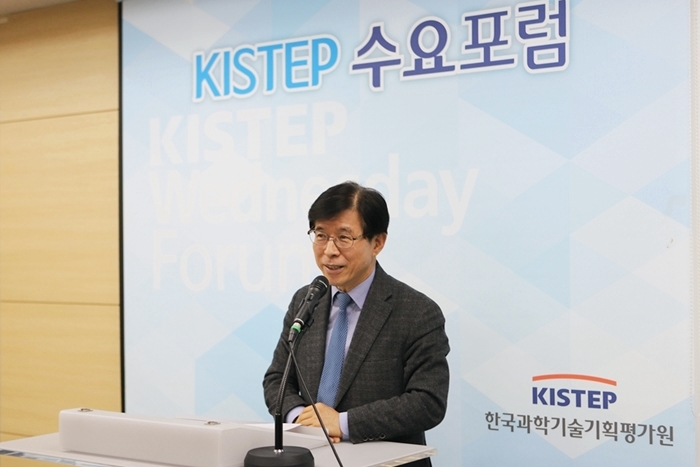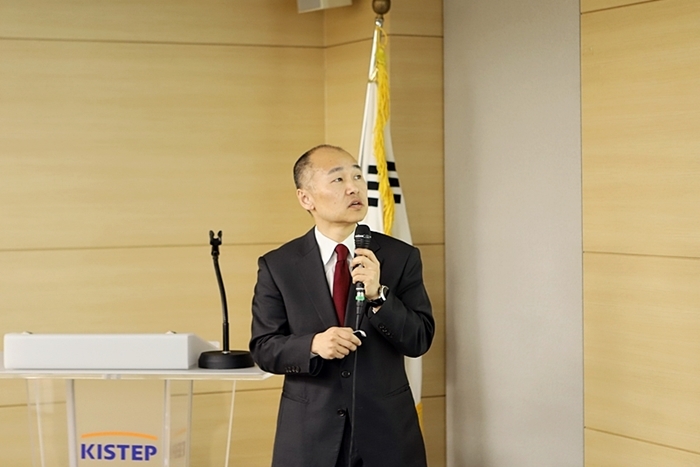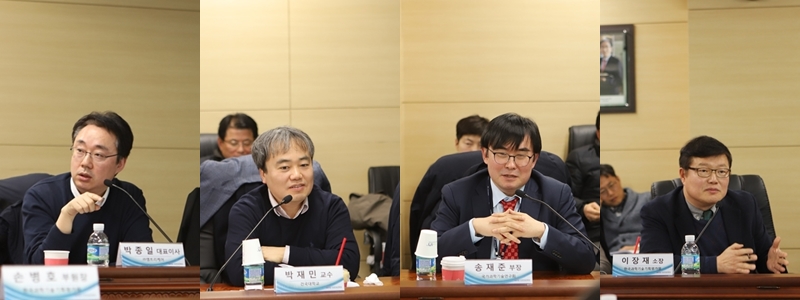News & Event


News & Event
News & Event
[The 98th KISTEP Wendnesday Forum] Path to Innovation Growth
- Writer Kyungran Choi
- Date2019-02-13
- Hit868
File
-
Download
 20190213153842.jpg
(33.77KB / Download 194회)
20190213153842.jpg
(33.77KB / Download 194회)
KISTEP held the 98th KISTEP Wednesday Forum with the theme of “Path to Innovation Growth(Science, innovation and decentralization” on February 13th (WED), 2019. The Forum was held to mark the year the current government’s national R&D innovation plans are implemented in earnest and find the problems and causes of innovation system and explore various national including innovator, role and ecosystem of innovation.

[▲ Sang-seon Kim, (President, KISTEP)]
The forum started with the opening address by President Sang-seon Kim (KISTEP), followed by presentation by Kwak No-Seong (Professor, Dept. of Science and Technology Policy, Hanyang University). Panel discussion were led by Peter Park (CEO, Mtreecare Co., Ltd.), Jaemin Park (Professor, School of Business / MOT, Konkuk University), Chaejun Song (Director, Division of R&D Strategy & Policy, National Research Council of Science and Technology (NST)), and Jang-Jae Lee (Director, Research Institute of S&T Innovation and Strategy, KISTEP), and open floor discussion followed the last.
In the presentation, Professor Kwak emphasized the main keyword of innovation growth which are ‘Science,’ ‘Innovation,’ and ‘Decentralization’ and said, “Innovation growth has not been achieved because of the system paralysis from lack of strategy. So we need to operate the system through scientific thinking and division of authority.”
In the presentation, Professor Kwak emphasized the main keyword of innovation growth which are ‘Science,’ ‘Innovation,’ and ‘Decentralization’ and said, “Innovation growth has not been achieved because of the system paralysis from lack of strategy. So we need to operate the system through scientific thinking and division of authority.”

[▲ Kwak No-Seong (Professor, Dept. of Science and Technology Policy, Hanyang University)]
He also emphasized the need to redefine the role of innovators by explaining the structural causes in the current vicious cycle of innovation growth, with the examples of ‘Korean R&D Paradox’ and ‘Troubled national program system.’
And he mentioned, “As the main tasks for innovation growth, it is necessary to maintain the national strategic system, rearrange the authority of the government and public institutes, balance among innovators, and reduce technical regulations in terms of the authority of the government.”
Lastly, he said “There are three steps of condition for strong organization and country, organizational power (step 1), autonomy to show creativity (step 2) and scale (step 3).” And he added “In order to revive Dynamic Korea, we need to nurture the ability of the innovation ecosystem by introducing a new promotion method based on the successful DNA which we have already done on the past.”

[▲ (from the left) Peter Park (CEO, Mtreecare Co., Ltd.), Jaemin Park (Professor, School of Business / MOT, Konkuk University), Chaejun Song (Director, Division of R&D Strategy & Policy, National Research Council of Science and Technology (NST)), and Jang-Jae Lee (Director, Research Institute of S&T Innovation and Strategy, KISTEP)]
During the panel discussion, Peter Park (CEO, Mtreecare Co., Ltd.) said, “There are many difficulties in the industrial fields because of the regulations that break people’s spirit to commercialization. Innovation is the path to survival, not growth in private sector, so we hope the government would change the framework of the R&D system to create an environment that would allow a competition between privates.”
Jaemin Park (Professor, School of Business / MOT, Konkuk University) pointed out, “The reason why innovation growth is not being carried out properly is that there is no change in the way policies are made, in terms of approaches, attempts, and ideas. It should move forward with 'steady', 'predictable' and 'careful' S&T policies focusing on the basics, along with the use of scientific autonomy and collective intelligence.”
Chaejun Song (Director, Division of R&D Strategy & Policy, National Research Council of Science and Technology (NST)) emphasized, “The government-funded research institutes should play a role in planning and policy support,” and added, “They should have a portfolio within the strategic system and the government should have an initiative system.”
“For innovation growth, we need to reconsider the meritocracy in S&T policy areas,” and added “The establishment of principles in intervention is needed for the politicization of S&T and administration sector. Also, scientification of S&T policy is necessary,” said Jang-Jae Lee (Director, Research Institute of S&T Innovation and Strategy, KISTEP).
Jaemin Park (Professor, School of Business / MOT, Konkuk University) pointed out, “The reason why innovation growth is not being carried out properly is that there is no change in the way policies are made, in terms of approaches, attempts, and ideas. It should move forward with 'steady', 'predictable' and 'careful' S&T policies focusing on the basics, along with the use of scientific autonomy and collective intelligence.”
Chaejun Song (Director, Division of R&D Strategy & Policy, National Research Council of Science and Technology (NST)) emphasized, “The government-funded research institutes should play a role in planning and policy support,” and added, “They should have a portfolio within the strategic system and the government should have an initiative system.”
“For innovation growth, we need to reconsider the meritocracy in S&T policy areas,” and added “The establishment of principles in intervention is needed for the politicization of S&T and administration sector. Also, scientification of S&T policy is necessary,” said Jang-Jae Lee (Director, Research Institute of S&T Innovation and Strategy, KISTEP).